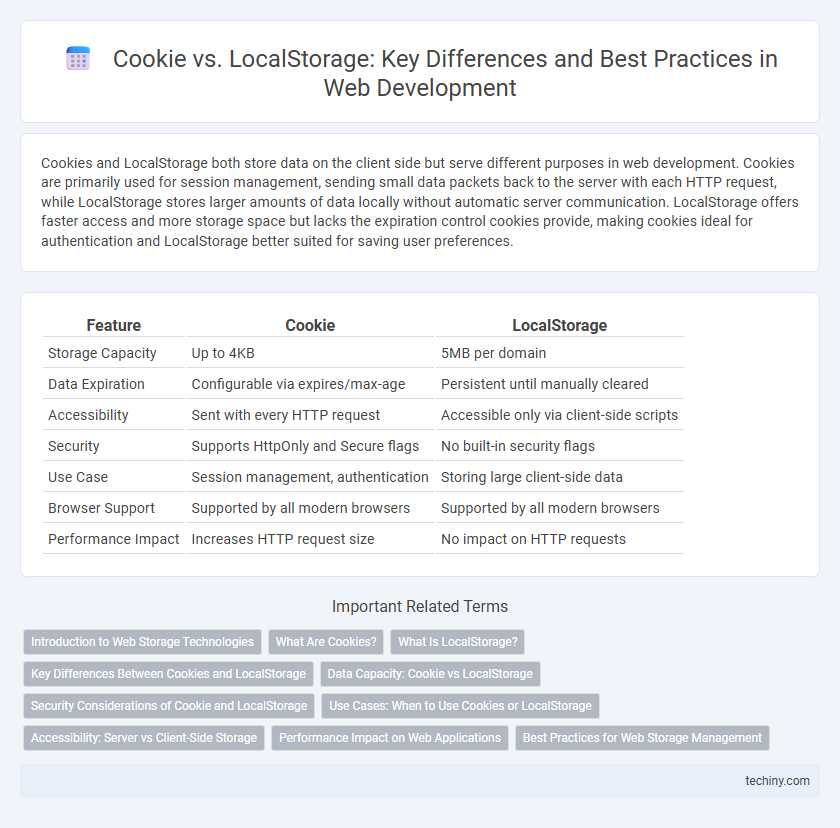Cookies and LocalStorage both store data on the client side but serve different purposes in web development. Cookies are primarily used for session management, sending small data packets back to the server with each HTTP request, while LocalStorage stores larger amounts of data locally without automatic server communication. LocalStorage offers faster access and more storage space but lacks the expiration control cookies provide, making cookies ideal for authentication and LocalStorage better suited for saving user preferences.
Table of Comparison
| Feature | Cookie | LocalStorage |
|---|---|---|
| Storage Capacity | Up to 4KB | 5MB per domain |
| Data Expiration | Configurable via expires/max-age | Persistent until manually cleared |
| Accessibility | Sent with every HTTP request | Accessible only via client-side scripts |
| Security | Supports HttpOnly and Secure flags | No built-in security flags |
| Use Case | Session management, authentication | Storing large client-side data |
| Browser Support | Supported by all modern browsers | Supported by all modern browsers |
| Performance Impact | Increases HTTP request size | No impact on HTTP requests |
Introduction to Web Storage Technologies
Cookies store small amounts of data sent with every HTTP request, enabling server-side session management but with limited storage capacity of around 4KB. LocalStorage, part of the Web Storage API, provides larger storage space (up to 5MB) directly accessible via JavaScript, ideal for client-side data persistence without affecting network traffic. Both technologies support web applications but differ in scope, security, and performance implications for managing user state and preferences.
What Are Cookies?
Cookies are small pieces of data stored on a user's browser that facilitate persistent state management and track user sessions across web pages. They are sent with every HTTP request to the server, enabling personalized experiences and user authentication. Cookies typically have expiration dates and can be configured for security attributes like HttpOnly and Secure flags to protect sensitive information.
What Is LocalStorage?
LocalStorage is a web storage API that allows developers to store key-value pairs directly in a user's browser without expiration dates, providing persistent data even after the browser is closed. Unlike cookies, LocalStorage offers a larger storage capacity, typically around 5 to 10 MB per domain, and does not send data with every HTTP request, enhancing performance. This feature is ideal for saving user preferences, theme settings, and application state across sessions in web development.
Key Differences Between Cookies and LocalStorage
Cookies store data sent with every HTTP request, enabling server-side access and session management, while LocalStorage saves data only on the client-side without automatic server communication. Cookies have size limits around 4KB and expiration settings, whereas LocalStorage allows up to 5MB of data storage with no expiration by default. Security-wise, cookies can be flagged as HttpOnly and Secure to prevent client-side access and enhance protection, while LocalStorage lacks such built-in security controls.
Data Capacity: Cookie vs LocalStorage
Cookies have a data capacity limit of approximately 4KB per cookie, which restricts the amount of information stored and sent with every HTTP request. In contrast, LocalStorage offers much greater storage capacity, typically around 5MB per origin, enabling web applications to save larger amounts of data locally without affecting network performance. This difference makes LocalStorage more suitable for storing extensive user preferences and session data compared to the minimal capacity of cookies.
Security Considerations of Cookie and LocalStorage
Cookies are susceptible to cross-site scripting (XSS) attacks if not properly secured with HttpOnly and Secure flags, allowing attackers to access sensitive session data. LocalStorage, while less vulnerable to certain types of network-based attacks, stores data in plain text and is accessible through JavaScript, making it a target for client-side XSS exploits. Implementing strict Content Security Policies (CSP) and minimizing sensitive data storage reduce security risks for both cookies and LocalStorage in web applications.
Use Cases: When to Use Cookies or LocalStorage
Cookies are ideal for managing user sessions, authentication tokens, and server-side data communication due to their automatic inclusion in HTTP requests with every server call. LocalStorage offers a more efficient way to store large amounts of client-side data, such as user preferences or theme settings, without impacting server performance, as data remains accessible only on the client. Choose cookies for data requiring secure, server-verified handling and expiration control, while LocalStorage is better suited for persistent, non-sensitive data that enhances client-side experience without frequent server interaction.
Accessibility: Server vs Client-Side Storage
Cookies enable server-side accessibility by automatically sending data with every HTTP request, facilitating session management and user authentication. LocalStorage operates exclusively on the client side, storing data persistently in the browser without server involvement, making it ideal for caching and maintaining client-state information. Server-side access to LocalStorage data requires explicit communication, such as AJAX calls, whereas cookies inherently provide seamless server and client data synchronization.
Performance Impact on Web Applications
Cookies send data with every HTTP request, increasing latency and server load, which negatively impacts web application performance. LocalStorage stores data locally without affecting network traffic, offering faster data retrieval and improved responsiveness for client-side operations. Using LocalStorage for non-essential data reduces server overhead, enhancing overall application efficiency and user experience.
Best Practices for Web Storage Management
Cookies are best suited for storing small amounts of data that need to be sent to the server with each HTTP request, while LocalStorage is ideal for larger, client-side data storage that persists beyond session expiry without server communication. Best practices for web storage management advocate minimizing sensitive data in LocalStorage due to security risks and implementing secure, HTTP-only cookies for authentication tokens to prevent XSS attacks. Proper usage also includes setting clear expiration policies, controlling data size limits, and regularly auditing stored data to ensure compliance with privacy regulations.
Cookie vs LocalStorage Infographic

 techiny.com
techiny.com